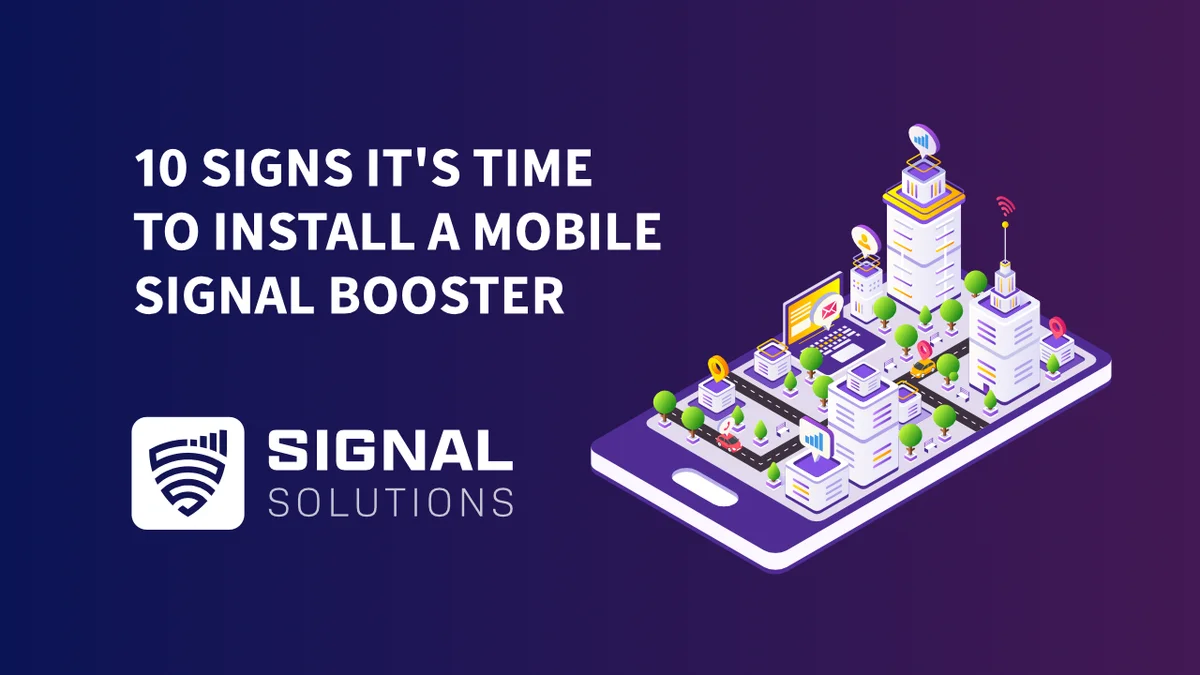
10 Signs It’s Time to Install a Mobile Signal Booster
We all know how much we rely on our mobiles day to day and it's not just for calls and texts, but also for data, apps, video meetings, and staying connected with colleagues, customers, or loved ones. When your signal lets you down, it can really disrupt business, productivity, and even how people perceive your organisation.
If you’ve been wondering whether a mobile signal booster is something you might actually need, here are 10 common, giveaway signs that it’s time to take action.
1. Frequent Dropped Calls Indoors
Nothing is more frustrating than a call cutting off mid-sentence. If it happens regularly inside your building, that’s a clear indicator your mobile coverage needs extra support.
Important client or sales conversations are disrupted, leaving a poor impression.
Staff waste valuable time having to redial or switch to another device.
2. Two-Factor Authentication (2FA) Notifications Don’t Come Through
Usually, security codes from banks, apps, and online services are often delivered straight to your phone via text message. But if those codes don’t arrive because of weak mobile signal, staff can end up locked out of accounts or left hanging in the middle of important transactions.
Time-sensitive processes grind to a halt when codes expire before they’re received.
Unlike calls, 2FA messages don’t transmit over Wi-Fi, so a strong mobile signal is absolutely essential for them to arrive.

3. Patchy Signal from Room to Room
One corner of the office is fine, but the meeting room down the corridor has absolutely zero mobile reception. That inconsistency is a classic sign the building itself is interfering with mobile coverage.
Modern buildings with thick insulation and new construction materials or energy-efficient glass can weaken / block mobile signals.
You end up with an unpredictable workspace where people never know if they’ll actually get a connection.
4. Your Business Operations Depend on Mobile Connections
If staff rely on mobiles for day-to-day tasks, whether that’s sales calls, customer support or site teams keeping in touch, but can’t maintain a steady connection, productivity takes a real hit.
Missed calls could easily mean missed orders, delayed customer service, or lost sales.
Employees become increasingly frustrated if they have to ‘work around’ the problem every day without even realising it.
5. Standing by Windows or Going Outside to Make a Call
If everyone knows “the only spot that works” is by a window, a stairwell, or outside in the car park, you don’t have reliable coverage where you actually need it... indoors.
This is not only impractical, it can also affect health and safety when staff step outside during bad weather or late at night.
Productivity drops as staff waste time relocating just to do something as basic as making a phone call.

6. Visitors or Guests Complain about Poor Signal
Whether it’s a client, a business partner, or a guest, people expect strong signal wherever they are. If complaints are becoming common, it can damage your reputation and customer experience.
A lack of mobile signal could discourage repeat customer or future business opportunities.
Even small frustrations, like not being able to check emails or messages, can shape how visitors feel about your brand.
7. It’s Happening Across Multiple Networks
If staff on different providers (EE, O2, Vodafone, Three, etc.) are all experiencing the same issue, it’s not the mobile network that’s at fault... It’s your location or the construction of the building.
This rules out the idea that simply switching provider will solve the problem.
It highlights a systemic coverage issue which only a booster system can address effectively.
8. Wi-Fi Calling Isn’t Cutting It
Wi-Fi calling might seem like a fix, but in reality, it’s not always reliable. What happens when the Wi-Fi drops? Or doesn't reach the entire building? What if someone has an accident and has to connect to the Wi-Fi first before calling for help?
Wi-Fi networks often prioritise internet traffic, which means calls can sound distorted or laggy.
Guests, clients, or contractors may not have access to your Wi-Fi at all, leaving them without a fallback option.
9. Health & Safety Risks
In an emergency, being able to use a mobile phone is vital but poor signal can take that option away.
Staff working in basements, warehouses, or on large sites may struggle to connect with colleagues or call for help when it matters most.
Lone workers, maintenance teams, and contractors often depend on mobiles as a safety line, leaving them exposed if there’s no reliable coverage.

10. You’re Working Towards WiredScore Accreditation
If you’re aiming for WiredScore certification, mobile coverage is now a crucial part of the process. It’s not something you can tick off later or only have a plan for, now you need to prove you have reliable mobile signal in your building.
With occupiers increasingly looking for certified buildings, poor mobile signal could hold back your rating.
In‑building mobile coverage is a specific requirement of the WiredScore certification so getting it right shows that your property is future‑ready and built to meet modern digital connectivity standards.
The Good News Is There’s a Solution...
The problems above may feel familiar, but they’re not something you just have to live with. Mobile signal boosters, using advanced technology like CEL-FI by Nextivity, are designed to eliminate 'dead zones' and provide reliable coverage throughout your building.
At Signal Solutions, we specialise in installing custom systems across the UK and Europe, ensuring you stay connected where it matters most.
If any of these pain points sound like your day-to-day reality, it’s probably time to consider a mobile signal booster. Get in touch with us today, and fill out our free solution design and quote here!